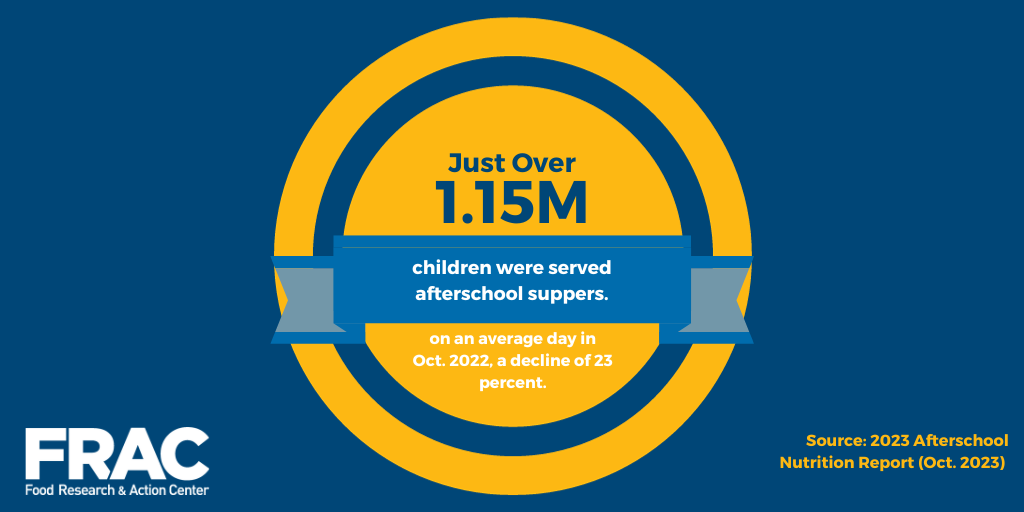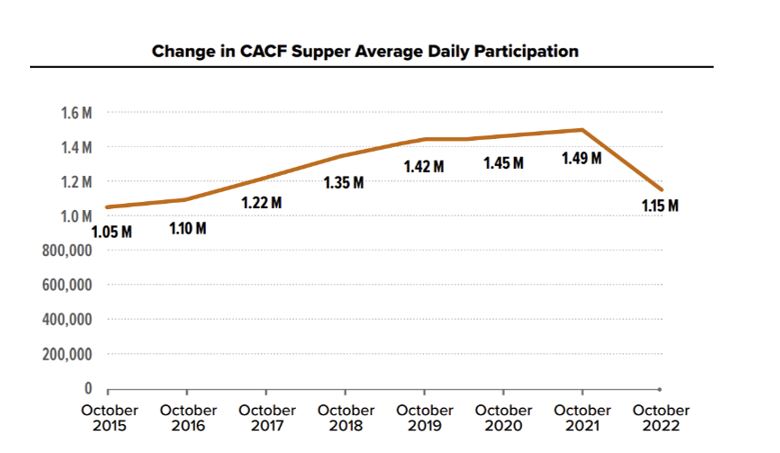October 31, 2023
Last week, the Food Research & Action Center (FRAC) released its annual report Afterschool Suppers: A Snapshot of Participation — October 2021 and October 2022, which looks at participation in afterschool suppers and snacks on the state and national levels. The report finds that just over 1.15 million children received afterschool suppers through the Afterschool Nutrition Programs on an average school day in October 2022, reaching 339,360 fewer children compared to October 2021.

Prior to the pandemic, program participation in the Afterschool Nutrition Programs, while still growing, had begun to plateau, and many eligible programs were still not participating. Ultimately, the program lost important ground during a time of elevated food insecurity, and a time when children urgently needed access to afterschool programming to help overcome the educational, health, and social and emotional impacts of the pandemic.

During the pandemic, participation in afterschool suppers remained relatively stable, with participation increasing by 2 percent in 2020 and 3 percent in 2021. To support access and to overcome the public health challenges created by the pandemic, the U.S. Department of Agriculture issued waivers that allowed all communities to offer afterschool suppers and snacks and addressed operational challenges. With the return to pre-pandemic operations, many afterschool programs and meal sponsors continued to struggle with staffing shortages and increased food prices. Many afterschool programs have either closed or had to limit capacity during the pandemic and have not been able to fully recover.
Looking ahead, it will take strategic and thoughtful investments and collaboration on all levels to ensure that the Afterschool Nutrition Programs can not only regain lost ground, but effectively grow to meet the need. These include:
- Child Nutrition Reauthorization. This legislative vehicle offers Congress an important opportunity to make long-term policy improvements to the Afterschool Nutrition Programs. One key proposal would allow all sponsors the opportunity to provide meals year-round through the Summer Food Service Program, which is less administratively burdensome than the Child and Adult Care Food Program. Lowering the area eligibility threshold that sites must meet to provide meals and snacks from 50 percent, which was an option through waivers during the COVID-19 pandemic, would make more low-income communities eligible to participate. Learn more about ways to strengthen the Afterschool Nutrition Programs.
- Leveraging and maximizing funding for afterschool programs. It also will be critical that the underlying afterschool enrichment programs, which traditionally go hand in hand with afterschool suppers and snacks, are championed and supported. Fortunately, recognition of the important role that afterschool programming plays is growing: In July 2022, the U.S. Department of Education launched the Engage Every Student Initiative designed to ensure that every student who wants a spot in a high-quality out-of-school time program has one. Advocates should also ensure that the funding made available through the American Rescue Plan is fully utilized and that any new afterschool programs are aware of the option to participate in the Afterschool Nutrition Programs.
- Revisiting lessons learned and best practices to increase access. While federal investments and improvements are needed to support broader access to the Afterschool Nutrition Programs, there are several ways that states and localities can expand the reach of the afterschool programs through programmatic best practices.
As sponsors and afterschool programs continue to adapt and recover from three years of pandemic operations, now is the time to take the lessons learned from prior to the pandemic and over the last three years to make these programs stronger, streamlined, and more accessible moving forward.
Learn more about closing the afterschool hunger gap in Afterschool Suppers: A Snapshot of Participation — October 2021 and October 2022.

